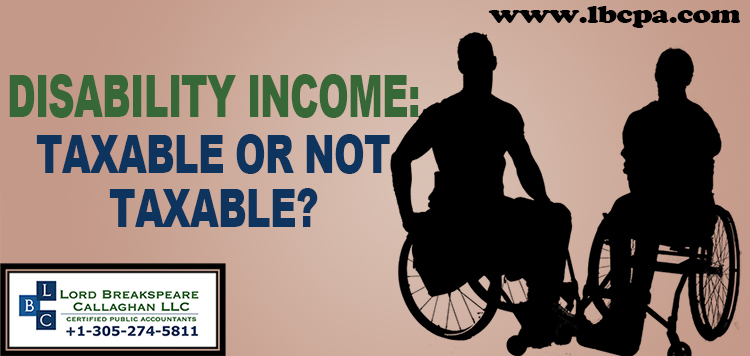LBCPA News 
Click here to go back
Is Disability Income Taxable?
Is Disability Income Taxable?Is Disability Income Taxable?
If you may be eligible for disability income should you become disabled, it’s important to know whether that income will be taxable. As is often the case with tax questions, the answer is “it depends.”
Key factor
The key factor is who paid it. If your employer will directly pay the disability income to you, it will be taxable to you as ordinary salary and wages would be. Taxable benefits are also subject to federal income tax withholding, though, depending on the disability plan, disability benefits sometimes aren’t subject to Social Security tax.
Frequently, the payments aren’t made by an employer but by an insurer under a policy providing disability coverage or under an arrangement having the effect of accident or health insurance. In such cases, the tax treatment depends on who paid for the coverage. If your employer paid for it, the disability income will be taxed to you, as if paid directly to you by the employer. But if you paid for the policy, the payments you receive under it won’t be taxable.
Even if your employer arranges for the coverage (in other words, it’s a policy made available to you at work), the benefits won’t be taxed to you as long as you paid the premiums. For these purposes, if the premiums were paid by your employer but the amount paid was included as part of your taxable income from work, the premiums will also be treated as paid by you and the benefits won’t be taxable.
Two examples
For simplicity, let’s say your salary is $1,000 a week ($52,000 a year). Under a disability insurance arrangement made available to you by your employer, $10 a week ($520 for the year) is paid on your behalf by your employer to an insurance company. You include $52,520 in income as your wages for the year: the $52,000 paid to you plus the $520 in disability insurance premiums. In this case, the insurance is treated as paid for by you. If you become disabled and receive benefits, they won’t be taxable income to you.
Now, let’s look at an example with the same facts as above, except that the amount paid for the insurance coverage qualifies as excludable under the rules for employer-provided health and accident plans. In this case, you include only $52,000 in income as your wages for the year because the insurance is treated as paid for by your employer. So, if you become disabled and receive benefits, they will be taxable income to you.
Note: There are special rules in the case of a permanent loss (or loss of the use) of a part or function of the body, or a permanent disfigurement.
How much coverage is needed?
In deciding how much disability coverage you need to protect yourself and your family, take tax treatment into consideration. If you’re buying the policy, you need to replace only your after-tax, “take-home” income because your benefits won’t be taxed. On the other hand, if your employer pays for the benefit, you’ll lose a percentage to taxes.
If your current coverage is insufficient, you may wish to supplement an employer benefit with a policy you take out personally.
Any questions?
This discussion doesn’t cover the tax treatment of Social Security disability benefits, which may be taxed under different rules. Contact us to discuss this further or if you have questions about regular disability income.
If you have any questions regarding Essential Business Accounting, Domestic Taxation, International Taxation, IRS Representation, U.S. Tax Implications of Real Estate Transactions or Financial Statements, please give us a call at +1-305-274-5811
Source : Thomson Reuters






